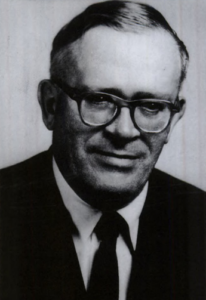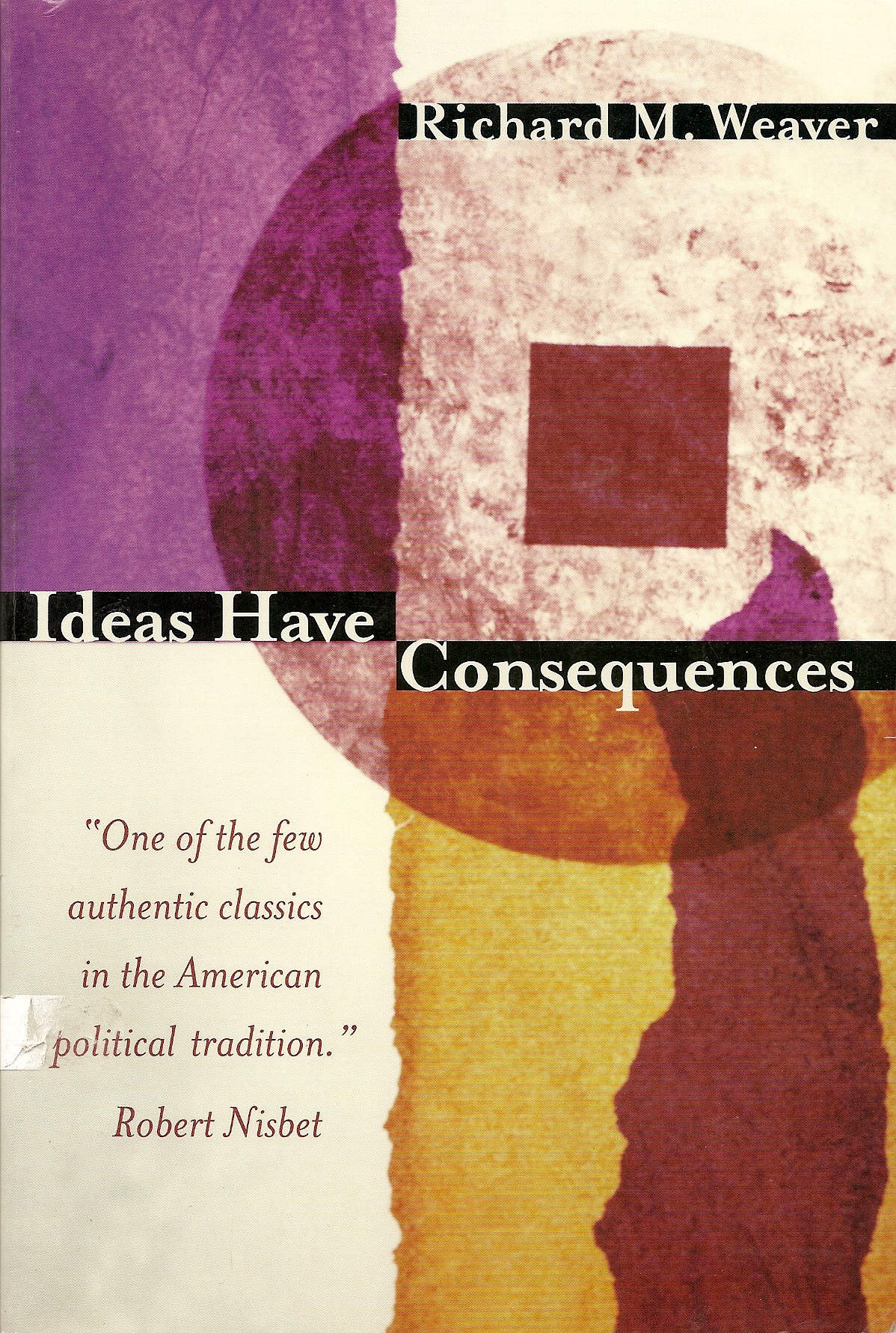In the first installment, we looked at Richard Weaver’s Introduction to his classic Ideas Have Consequences. Here, we move into chapter one, where he posits what it means for a man to be part of a  culture. As such, he declares that such a man has three levels of conscious reflection: 1. his specific ideas about things; 2. his general beliefs or convictions; and 3. his metaphysical dream of the world.
culture. As such, he declares that such a man has three levels of conscious reflection: 1. his specific ideas about things; 2. his general beliefs or convictions; and 3. his metaphysical dream of the world.
The first of these levels refers to “the thoughts he employs in the activity of daily living.” In other words, these are the things that are actively taking place at a particular point in time, leading to the man’s response to those stimuli. For brief periods of time, a man can exist solely on this level, but to remain at this stage indefinitely leads to disharmony and conflict.
The second level underlies the first, as they encompass his body of beliefs. Some might be passed down from his forebears, while others might be those ideas that he has developed via his own experience. He bases his decisions at the first level by the body of beliefs at this second level that guide his life.
The third level is the foundation upon which both of the other levels are built. The man has some intuitive thoughts or feelings about the “immanent nature of reality” that verify his beliefs and ideas. Weaver argues that it is this third level that is required for community and culture. Common foundational truths are a requirement for community.
Though a philosopher, Weaver warns against relying on reason alone. If that third level is not properly formed, reason can cause great harm. “If the disposition is wrong, reason increases maleficence; if it is right, reason orders and furthers the good.”
Taking this as the starting point, Weaver continues to explore the concept of culture and what it really is. “A developed culture is a way of looking at the world through an aggregation of symbols, so that empirical facts take on significance and man feels that he is acting in a drama, in which the cruxes of decision sustain interest and maintain the tone of his being.” As such, culture does not view the world sentimentally. There must be something deeper, some hierarchy or arrangement to guide reason.
Those fundamental beliefs are vital. Weaver savagely attacks the idea that some advocate, regarding the fact that it doesn’t really matter what a man believes. Here, he refers to that third level mentioned above. Rather, what a man believes “places a stamp upon his experience, and he belongs to a culture, which is a league founded on exclusive principles.” This means that people in a group who know what to say, when to say it, and how the others in the group will respond.
Weaver could see a coming time when such culture would be attacked, as America vulgarizes Europe and Europe corrupts America. He does not get into a discussion about other parts of the world, focusing on Western culture. Those who eschew traditional culture tend to view their predecessors as “fearful of reality.” These change agents want to do away with individual cultures and replace it with some esoteric “natural state” of humanity, where everyone is the same. As such, all cultural morals and expectations of decency are done away with, treated with derision.
The consequence is a loss of discrimination. Suddenly, everything is permissible and even desirable. Rather than adhering to the foundational level of understanding reality, this new man relies solely on material reality. Weaver argues that such a world view “is a knowledge of death. This desire to get ever closer to the source of physical sensation – this is the downward pull which puts an end to ideational life.” In other words, we need some distance from reality to properly understand it. “To insist on less is to merge ourselves with the exterior reality or to capitulate to the endless induction of empiricism.” Here, he argues that modern journalism plays a role in this debasement. This “sensational journalism everywhere testifies to man’s loss of points of reference, to his determination to enjoy the forbidden in the name of freedom…The area of privacy has been abandoned because the definition of person has been lost; there is no longer a standard by which to judge what belongs to the individual man.” Here, Weaver appears prescient. “The raw stuff of life is precisely what the civilized man desires to have refined, or presented in a humane framework, for which sentiment alone can afford the support.”
 And what is the result? The deterioration of human relationships. This occurs because there is no longer a communal framework through which to evaluate the immediacies of life. Everything is focused on the moment and instant gratification. That leaves no room for true relationships. Parents are discarded as being old and useless. Children become liabilities. Friendship fades away, replaced by acquaintances.
And what is the result? The deterioration of human relationships. This occurs because there is no longer a communal framework through which to evaluate the immediacies of life. Everything is focused on the moment and instant gratification. That leaves no room for true relationships. Parents are discarded as being old and useless. Children become liabilities. Friendship fades away, replaced by acquaintances.
“When the primordial sentiments of a people weaken, there invariably follows a decline of belief in the hero.” Weaver offers the example of a traditional soldier as hero. He distinguishes between this archetypal heroic soldier and modern automaton who will the ranks of the modern militaries. That traditional soldier, living by cultural ideals, holds those values above property and life. As such, “the historical soldieris by genus not the blind, unreasoning agent of destruction…[but] the defender of the ultima ratio, the last protector of reason. He knows the meaning of a “fate worse than death,” something missing from the lexicon on most modern people.
This leads to one of Weaver’s more controversial arguments: the loss of the hero leads to gross commercialization. There is a cause-and-effect relationship. The commercial man’s “mind is constantly on the fluctuating values of the market place, and there is no surer way for him to fail than to dogmatize and moralize about things.” Culture disappears, replaced by communities where people simply live near one another in the same place, but devoid of “friendship or common understanding, and without capacity, when the test comes, to pull together for survival.”
He contrasts this with the traditional metaphysical community, as described in the three levels above. A healthy metaphysical community, “suffused with a common feeling about the world which enables all vocations to meet…and to enjoy the strength that comes of common tendency,” can successfully navigate turmoil and survive. His “plea then must be to have back our metaphysical dream that we may save ourselves from the sins of sentimentality and brutality…Our task is much like finding the relationship between faith and reason for an age that does not know the meaning of faith.”
Reflection
For the most part, Weaver is dead on correct. When we lose our cultural underpinnings, we have no way to interpret the world around us, save for dealing with the minutiae of life as it comes at us. What you judge good and correct may well be at odds with your neighbor’s interpretation, and there is no arbiter to solve the conundrum. It is truly each man for himself, which is no way to have a culture. I do think some may read his comments on commercialism and discount his views, as we are all good Capitalists, but I think he is correct that Capitalism should work for us, not the other way around. It is a means to an end, not the end itself. There is a distinction between Capitalism and commercialism, of course, but they are related. There is more to financial dealings that maximizing profits. There is a culture to keep in mind. So if we take his point and consider that it might be best understood as desiring a limited commercialism, then we can find some common ground. Profits are good and desirable, but they should not damage the culture.










4
Well dang it Theo. I looked forward so much to this next installment for some great debate…but well…all that can be offered is a nod of agreement. Guess we’ll have to wait for the NEXT one.
I pretty much tend to agree with Weaver on most things. Certainly, there are details upon which to quibble, but the overarching positions tend to be pretty sound.
5